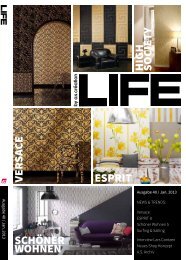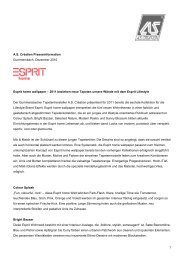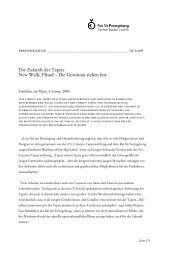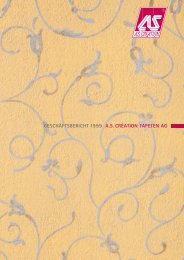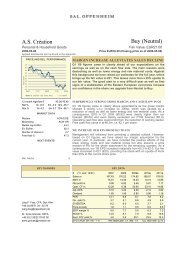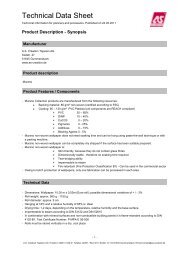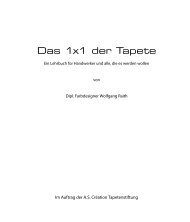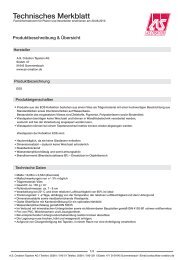ANNUAL REPORT 2011 A.S. CRÉATION TAPETEN AG
ANNUAL REPORT 2011 A.S. CRÉATION TAPETEN AG
ANNUAL REPORT 2011 A.S. CRÉATION TAPETEN AG
Create successful ePaper yourself
Turn your PDF publications into a flip-book with our unique Google optimized e-Paper software.
possible. On the other hand, there are countries<br />
such as Germany, which are highly competitive<br />
and therefore benefit significantly from the<br />
increased demand, e.g. from the emerging<br />
markets, and which recorded strong capital<br />
spending activity (both spending on plant<br />
and equipment and construction spending).<br />
Accordingly, Germany’s gross domestic product,<br />
which had increased by an impressive 3.7%<br />
already in 2010, rose by another 3.0% in <strong>2011</strong>.<br />
As a result, some sectors in Germany reported<br />
sales revenues that exceeded the pre-crisis<br />
levels already in <strong>2011</strong>. The major differences<br />
between the euro-zone economies are also<br />
reflected in the jobless rates, which picked<br />
up in countries such as Italy and Spain and<br />
declined in others, above all in Germany. At<br />
10.1%, the jobless rate for the euro-zone as<br />
a whole remained unchanged from the previous<br />
year. In the course of the year, economic activity<br />
in the euro-zone slowed down markedly,<br />
though. Quarterly GDP growth rates declined<br />
and jobless rates picked up. Accordingly, some<br />
economic researchers already stated a mild<br />
recession for the euro-zone at the turn of the<br />
year <strong>2011</strong>/2012.<br />
The economy in Russia – A.S. Création’s most<br />
important output market in Eastern Europe –<br />
remained virtually unimpressed by the euro<br />
and sovereign debt crisis in the west. As in the<br />
previous year, Russia benefited from growing<br />
global demand for commodities and energies<br />
and, hence, from rising prices. China has become<br />
Russia’s most important trading partner, as<br />
Chinese demand for Russian commodities and<br />
energies continues to grow. Besides the higher<br />
exports, the fact that consumer spending<br />
picked up against the background of declining<br />
inflation and a lower jobless rate also had a<br />
positive impact on the economy. With GDP<br />
growing by 4.3% in <strong>2011</strong>, Russia’s economic<br />
situation in the fiscal year deserves to be called<br />
positive. However, this reduces the pressure<br />
on government officials to push ahead the<br />
transformation of the Russian economy, which<br />
continues to be dominated by commoditybased<br />
sectors (oil, gas, minerals and metals).<br />
In the absence of internationally competitive<br />
industries outside the commodities sector,<br />
Russia risks being hit particularly hard by<br />
another global economic crisis. In the 2009<br />
financial and economic crisis, Russia was the<br />
industrialised country whose GDP dropped most<br />
sharply, namely by 7.9%. Russia’s accession<br />
to the World Trade Organization (WTO), which<br />
was decided on December 16, <strong>2011</strong>, should<br />
provide positive stimulation to the Russian<br />
economy. The WTO organises international<br />
trade relationships through binding rules on<br />
the basis of free trade, provides procedures for<br />
settling disputes and monitors and scrutinises<br />
its members’ trade policies and practices. In<br />
particular, trade between the European Union<br />
(EU) and Russia could benefit from lower customs<br />
tariffs and the harmonisation of product<br />
GROUP MAN<strong>AG</strong>EMENT <strong>REPORT</strong><br />
33




